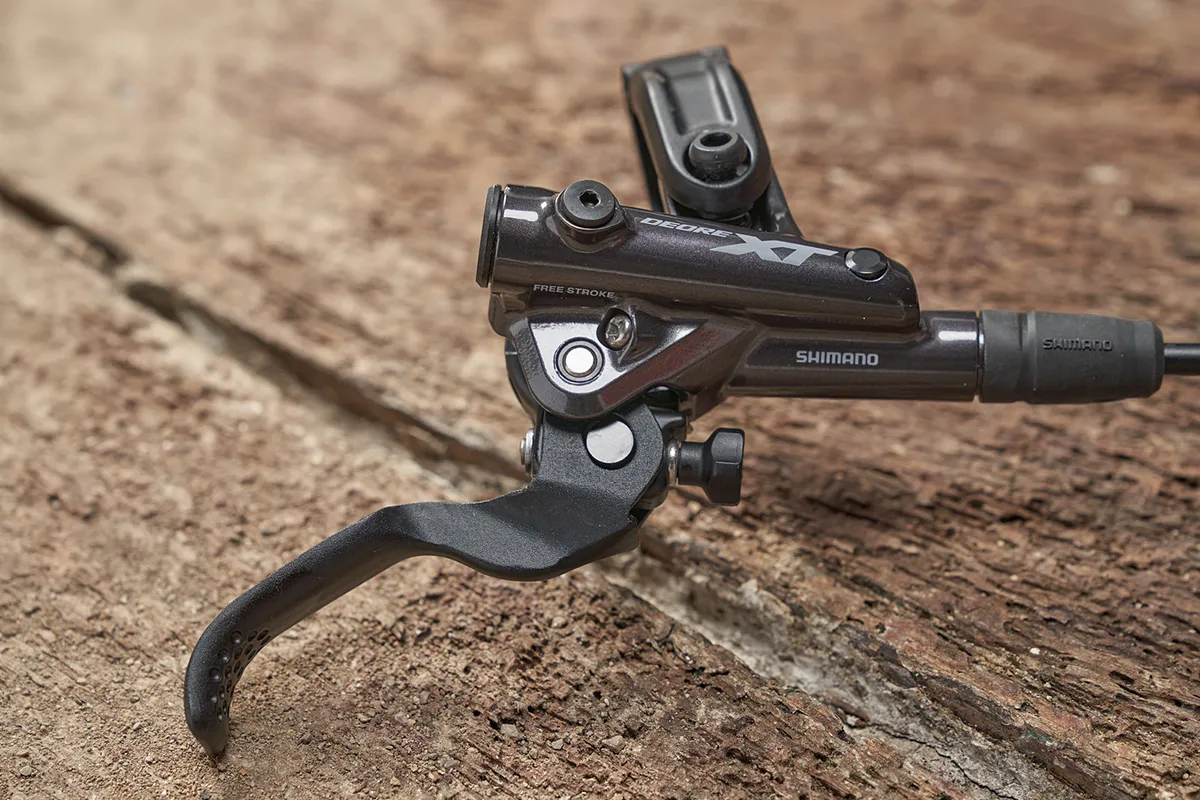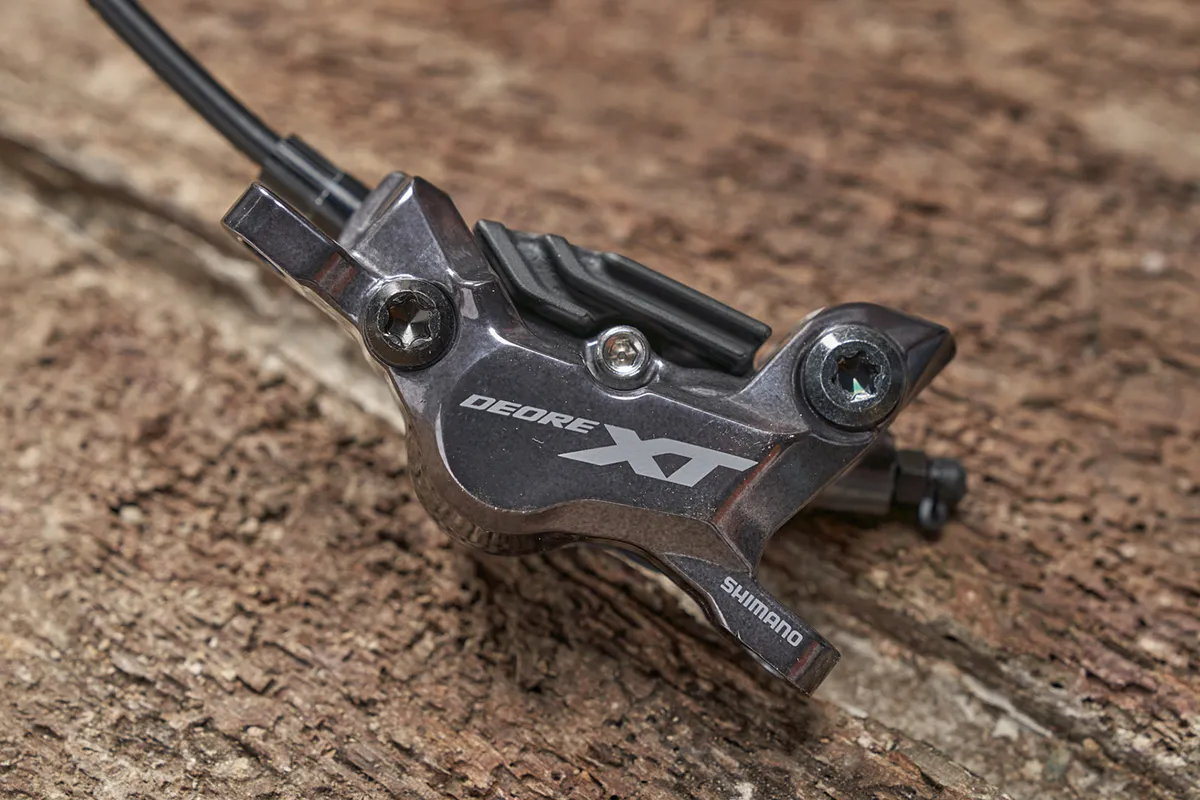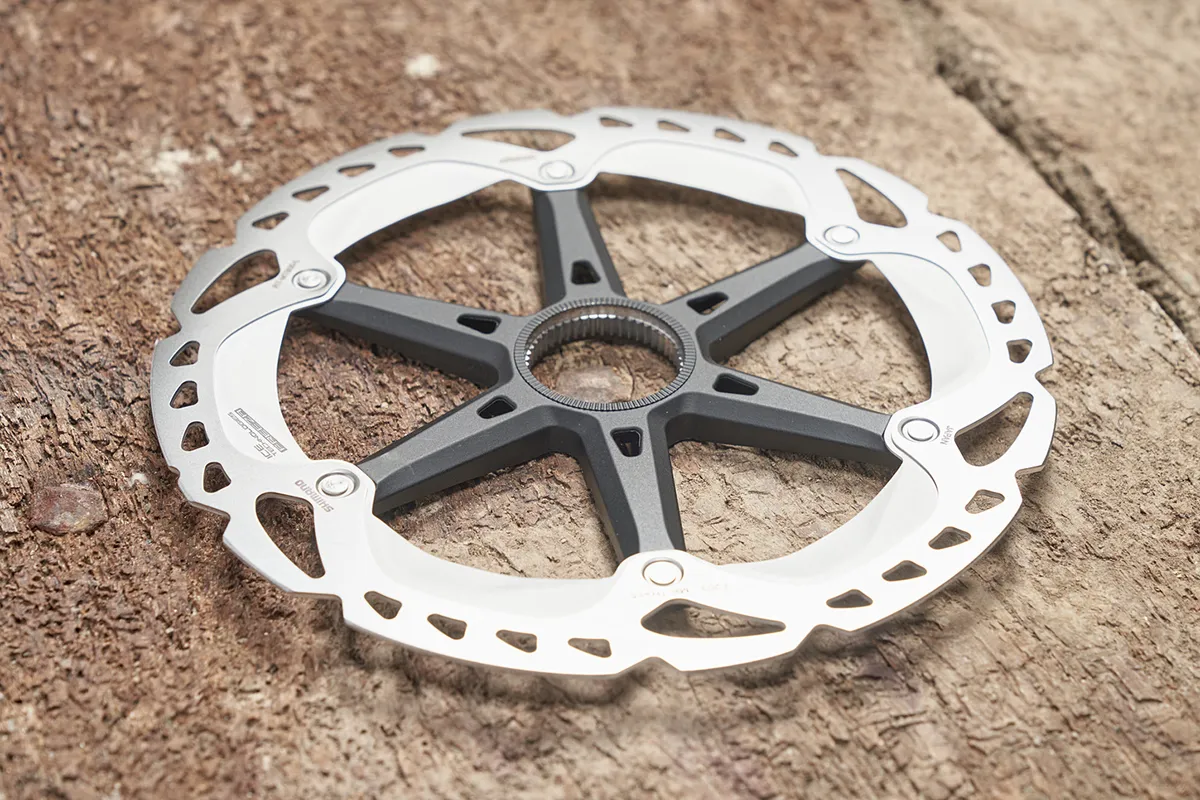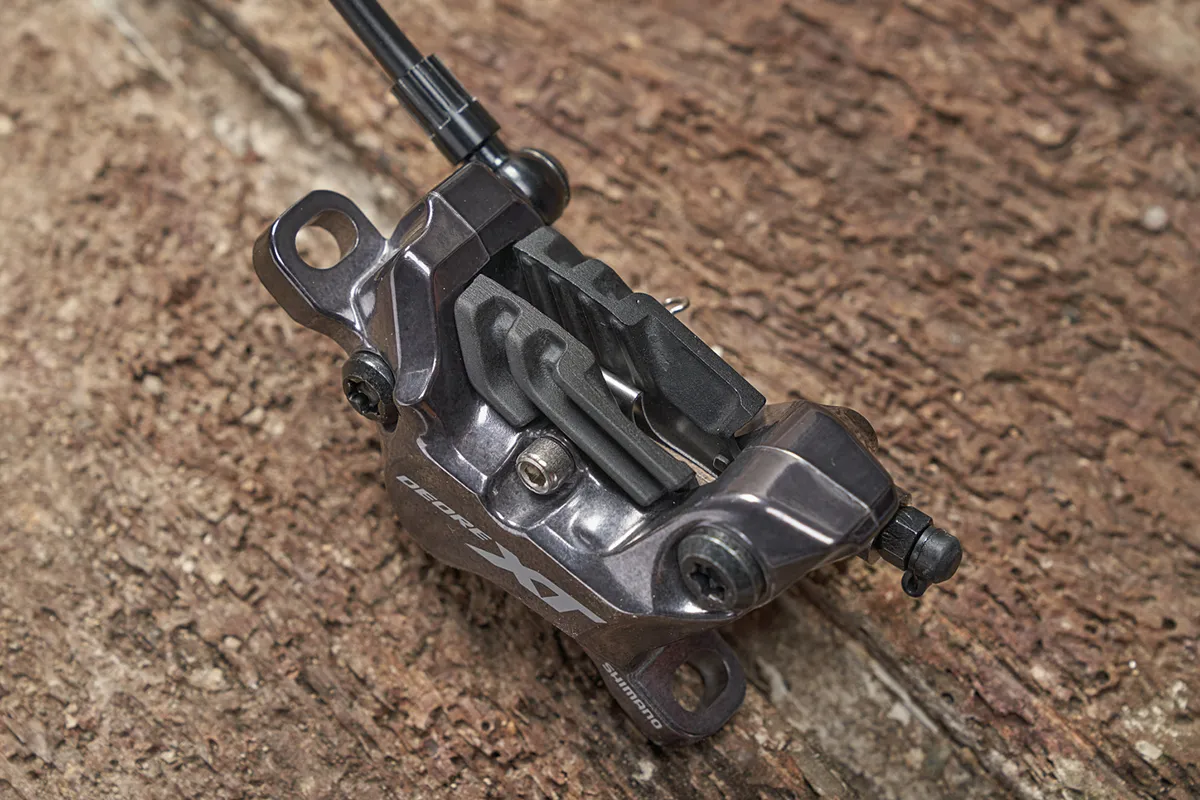Shimano XT is the workhorse of the Japanese brand’s drivetrain and brake families, combining virtually every feature of its range-topping XTR series, but at a lower price point.
When it comes to its four-piston brakes, does this reduced cost impact on performance?
Shimano XT M8120 brakes specification

Shimano’s customary lever shape is featured on these XT brakes. It's relatively short with a prominent upturn at the end to keep your fingers locked on. This nubbin at the end has a slight texture, too.
Being the trail version rather than the lighter-weight race iteration of the brake, the lever has both tool-free reach adjustment and a free-stroke (or bite-point) adjustment via a crosshead screw.
The lever pushes the master cylinder via Shimano’s Servowave cam, which pushes the brake pistons further during the early lever stroke than it does later in the lever stroke. This gets the pads hitting the rotor quicker, allowing better clearance, and then adds to the brake’s modulation later on.
The levers attach to the bar via a split clamp. To open the clamp requires the insertion of a narrow pin into a lock. I’m not sure why this feature really exists and it adds little benefit, making lever removal more of a hassle than other brakes.
The clamp can be mated to Shimano’s own shifters easily, and there are options out there for various dropper post levers and SRAM shifters.

The clamp is situated mid-way along the lever body, but Shimano adds a brace right at the end of the body that sits against the bar, in order to prevent lever-body flex. However, it can interfere with shifters or dropper levers if you’re not running them with the integrated mounts.
Hoses arrive unattached. This means they can be routed easily through frames when building a bike, before you attach them to the pre-plugged and filled lever with an 8mm spanner.
In practice, I’ve found this very easy, and have not had to re-bleed the brakes once I’ve done this. Occasionally, though, after cutting hoses, I’ve needed to re-bleed the brakes.
At the two-piece caliper, four phenolic pistons push onto a long, sintered brake pad. The backing plate includes heat-dispersing fins to aid temperature management and the hose leaves the caliper via a banjoed connector, enabling the hose exit angle to be adjusted to aid rear-triangle hose routing.
Shimano XT M8120 brakes performance

The sintered pads bedded in surprisingly quickly; I was pulling stoppies within a couple of runs, much faster than I’d expected. The power on offer is clearly up to the task, too, with the brakes bringing me to a stop on steep terrain on a heavy e-MTB.
Shimano has a reputation for very digital-feeling brakes, and the initial bite of the XTs is punchy, with a lot of power delivered early in the lever’s stroke. However, I don’t find it unmanageable at all.
On technical terrain, I like knowing there's a lot of usable power, easily accessible without having to pull the brake lever a long way through its rotor contact stroke. In this regard, it’s similar to the SRAM Code R I've also tested.
However, the Code R perhaps has a little more punchiness at the end of the lever’s stroke. The XTs seem to build their power in a slightly more linear fashion.
Overall, the lever feel is firm with little mushiness, certainly compared to brakes from Magura, for example. During its power phase, lever travel is fairly short, but it remains light and smooth throughout.
The lever ergonomics suit me and there’s a good range of reach adjustment. However, the free-stroke adjustment on my brakes was less impactful than I’ve experienced elsewhere. Still, I have never found it difficult to get the brakes set up to my preference.
On long descents, the finned pads seem to help with heat management, however I've found they rattle due to the extra weight of the fins.
I have also experienced noise from the rear brake, especially when the weight of the fins overcomes the pad’s ability to hold the pad away from the rotor, and the pad then reverberates.
Bleeding the brakes as per the instructions that come in the box can be a little confusing; online guides seem to be better written. Getting a decent bleed is moderately easy using Shimano’s bleed pot, however there are systems out there with easier, more reliable bleed processes.
I’m happy to report that on my test brakes, as well as numerous other XT brakes on test bikes, I’ve not had a wandering brake point for a while now. This can develop with time, though, so I’ll update this review if I experience it again.
Shimano XT M8120 bottom line

With an excellent lever feel, in part thanks to a light stroke, positive bite and non-flexing lever body, combined with ample stopping power, the XT remains a benchmark brake.
It’s not without fault, because bleeding could be easier and it's not the quietest.
However, I would never complain at seeing an XT four-piston brake on any test bike, and I would happily recommend the M8120.
How we tested
This year, our expert reviewers have tested a selection of the best mountain bike brakes, split into two broad genres.
First, there’s a selection of the most powerful stoppers, aimed at downhill, enduro and electric mountain bike riders. We’ve kitted these brakes out with 200mm rotors front and rear to get the most out of their four-piston calipers and tested them on an e-MTB and our enduro bikes.
The second cohort is targeted at cross-country and downcountry riders, who still need plenty of stopping power without upsetting the scales. These two- and four-piston brakes grab onto 180mm and 160mm rotors in our testing, fitted to our downcountry test rig.
Before hitting the trail, we gave each brake a full going over in our workshop. Hoses were cut to get the brakes fitting neatly and to check out how easily they’re bled at home. We weighed and measured them, making sure no detail was missed.
We lined our levers up against SRAM and Shimano shifters to see which play nicely and weighed up the balance of cost and spec in order to reach our conclusions.
Brakes on test
Product
| Brand | shimano |
| Price | 200.00 GBP,210.00 USD |
| Weight | 314.0000, GRAM () - |
Features
| br_brakeType | hydraulic_disc |
| Features | Hose length: 950mm / 1,700mm Aimed at: DH / Enduro |
